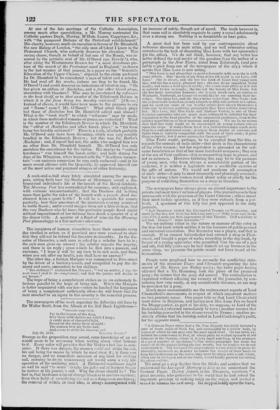The imaginers of human absurdities have their conceits every day
rivalled in action, as if practical men were resolved to show that they will not be behind the theorists in absurdity. In the Fa- cetim of Hierocles, a sick man is asked by a scholar how he is ; the sick man gives no answer ; the scholar repeats the inquiry, and there is no reply ; upon which he flies into a passion, and exclaims, " I hope it will be my turn to be sick soon, and then, when you ask after my health, you shall have no answer ! " The other day, a foreign Marquis was summoned to Bow-street by the driver of a hackney-coach, and compelled to pay the de- mand and costs, amounting to ten shillings.
" Ten shillings I" exclaimed the Marquis ; " but no matter, I hope the next time I shall be the complainant, and that the justice will decide in my favour."
The hope of being a complainant strikes us as an extremely fe- licitous parallel to the hope of being sick. When the Marquis is better acquainted with our law—when he has had the happiness of being a complainant sufficiently often—he will know that the next mischief to an injury in this country is the remedial process.


















 Previous page
Previous page